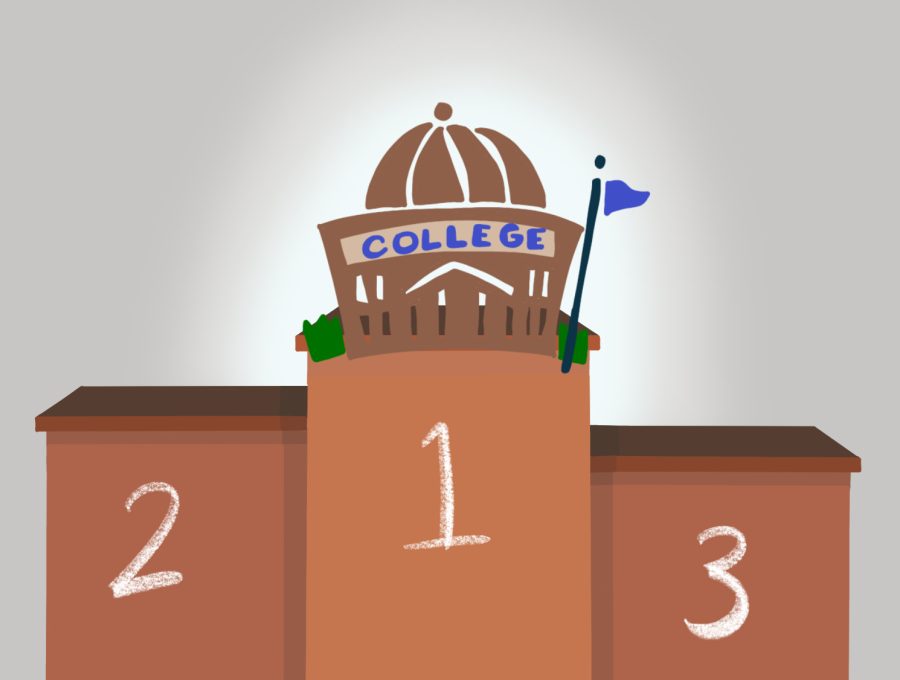Opinion: From a student who used to worship them, college rankings are worthless
The recent allegations that Columbia University exaggerated statistics to improve its US News & World Report ranking demonstrate that it’s past time to retire the false prestige of college rankings.
(Illustration by Manasa Gudavalli)
March 23, 2022
Leading up to my senior year of high school, my party trick was reciting the top 50 schools in US News & World Report’s rankings from memory. It’s embarrassing to admit that its standing on some silly list was one of the biggest factors I considered when choosing which schools to apply to and which to ultimately attend.
Now that I’m actually in college, the top 50 schools and their order have faded from my mind, and the fact that I go to the supposedly 28th-best school in the country doesn’t impact my daily life as much as I once thought it would. My perspective was toxic, and my urge to compare was only a hindrance, but the fact that these rankings continue to exist is the worst of all.
The New York Times reported last week on the findings of Columbia University’s Michael Thaddeus that Columbia’s rise — from No. 18 at the list’s 1988 conception to No. 2 this year — was driven by dubious data. US News & World Report uses self-reported data to rank the universities, and Thaddeus found that many of Columbia’s claims were exaggerated in order to maximize positive factors and climb toward the top of the rankings. US News’ reliance on universities to provide accurate data enables attempts to cheat in the rankings.
This isn’t the first time that the accuracy and prestige of these rankings — despite their importance to many high school students — has been brought into question. Northeastern University has been notorious for gaming the rankings. They introduced programs where students who tend to have lower grades study away for a semester or a year. Because those students aren’t going directly to the university, their statistics are not included in the ranking data.
The US News list uses 17 factors to determine its rankings. Each factor is given a certain percentage of weight in determining a school’s placement. The graduation and retention rate is valued as 22% of the total, while graduate indebtedness is only valued as 5%. A school like NYU, with its average of $20,500 of undergraduate student loan debt after graduation, is effectively forgiven for this classism because that factor is weighted as lower than “student excellence,” which is valued at 7%. The excellence factor is based on performance on the SAT and ACT, as well as accepted applicants’ academic performance in comparison to their graduating high school class.
But strong performance in standardized tests is consistently correlated with the students’ race and affluence. While students all take the same tests, each student differs in the opportunities that they’ve had to learn the material. The SAT and ACT reaffirm the racism in education in the United States. There is a stable scoring gap between Black and white SAT takers; an astounding 64% of students scored between the average white student scores and the average Black student scores. While these inequalities and the COVID-19 pandemic have led many universities to go test-optional in admissions, test scores are still highly valued by many elite schools. The continued emphasis on standardized testing, despite their inherent racism and classism, creates an uneven playing field for the already ultra-competitive college admissions experience. Yet a school’s selectivity, despite being based on these flawed factors, can make or break its position on the sacred list of colleges in America.
Really, these rankings are a representation of how much money a school has, whether it be from the students that can afford full tuition, the alumni or their endowment. They’ve made universities as hyperfocused on a number as I and many of my peers were when we applied to college. Universities are so driven to be at the top that they will exaggerate accolades or introduce programs that lower their acceptance rates. They are missing out on the students with wonderful experiences and ambition who didn’t have the advantages of an affluent background, like money for tutoring, standardized test preparation or college admissions counseling. The value of a college education and the mission to diversify, commit to and advance your learning is lost when the ultimate goal is a single-digit number.
These rankings tell us the same thing every year. The same 50 universities shift around and the top 10 stay relatively the same, but that doesn’t necessarily mean that a student will get a better education at Harvard than NYU. Universities and students should be on a quest for mutual fit — for students that match their philosophy on education, not students that match an elite SAT score. The education sector should be preparing students to thrive as people, not showing how many of their alumni go off to Goldman Sachs or Google. Impressive statistics might inspire an ambitious student to apply to a university, but they should aim to get there with preparedness and performance, not to be able to tout their future alma mater’s standing on a list.
I got lucky; despite my previous fixation on rankings, I chose a school that fit me. Applicants should look for a school that fits them and their ambitions, and universities should seek students with stories and passion that are a good fit. If higher education sets a precedent of valuing the education of young minds over illusions of prestige, an influx of strong students will follow.
Yes, I love going to the 28th-best school in the country. I love that all of my hard work in high school — every minute spent in extracurriculars and editing essays and doing homework to go to a prestigious university — was validated when NYU accepted me. That validation lasted about 28 seconds.
I’ve only been at NYU for a short time, but every minute spent writing for WSN or speaking in one of my classes or getting involved with the Jewish community on campus or even just hanging out with my friends is worth so much more than being 28th on a list.
Views expressed in the Opinion section do not necessarily reflect those of WSN, and our publication of opinions is not an endorsement of them.
Contact Alexandra Cohen at [email protected].

























































































































































